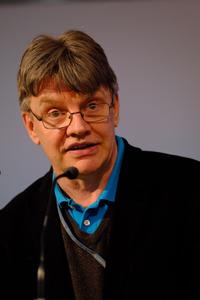DM2023: Ethics
Motions on media intrusion into grief, fake news and on reporting poverty were debated.

A motion from the Ethics Council about media intrusion into grief opened this section of DM. It referenced an upheld complaint to the Independent Press Standards Organisation (IPSO) by journalist Mandy Garner, over coverage of her daughter Anita’s death. The motion proposed by Simon Barrow (pictured) said improving Clause 4 of the IPSO code and other editorial codes would require considerable effort and conference agreed the NEC would initiate an investigation led by the Ethics Council into media intrusion into grief.
A Dublin Freelance branch motion focused on the need to promote the NUJ code of conduct to combat ‘fake news’. Wiltshire branch and the Ethics council both amended the motion and conference agreed the NEC should bring forward a campaign with the Ethics Council to promote the code of conduct, issuing an interim report this year and a full report to the next DM.
Gareth Simkins, from the Public Relations and Communications Committee, raised the importance of media literacy and professional journalism in tackling fake news. He said “everyone is here for the fight against fakery”. The motion instructing NEC to campaign for recognition for PR and communications professionals and the role they play in providing factual information and campaigns in the public interest, was agreed.
An Ethics Council motion passed by delegates noted concern about the lack of specialist guidance alongside about court cases involving rape or sexual assault in the UK. Reporting on trans-identified defendants has been varied regarding the use of names and pronouns from analysis of 39 court cases. DM passed the motion and agreed the Ethics Council should seek specialist advice and create guidance on the reporting of such cases to accompany the union’s code of conduct.
Research by the Joseph Rowntree Foundation revealed that more than one in five of the UK population were in poverty in 2022. Motion 36 tabled by Manchester and Salford branch and moved by Dave Toomer explored the Reporting Poverty campaign originating with the branch. The motion noted the NUJ had been instrumental in opening a discussion on the reporting of poverty and that discriminatory language in the media could lead to the demonisation of working people including those in receipt of benefits.
David Toomer said “We are still in a climate that stigmatises the poor. It is about ensuring fair and accurate representation of a significant section of our society.” Christina Zaba speaking on behalf of the NEC in support of the motion said it was not right to talk about fraud in the welfare system, saying “shame is toxic, it keeps people silent on things that should outrage them”. Conference passed the motion and it was agreed NEC would continue to support the campaign and update guidance for members, and the union would monitor the development of media coverage, providing support to members to ensure communities including those experiencing poverty would not face abuse through coverage.
A Bristol branch motion agreed by conference noted the Information Commissioner’s Office (ICO) consultation on a draft code of journalism practice, but expressed concern that restricting images if they revealed a person’s ethnicity – a protected characteristic under the Data Protection Act -- would be incompatible with press freedom and the right to report. The NEC was instructed to make representations to the ICO that the code of journalism practice does not restrict images on basis of visually revealing a person’s protected characteristic.
Motion 38 was tabled by Bristol branch. The motion on the reporting of issues on sex and gender instructed the NEC to consider whether a statement affirming it was appropriate for journalists to discuss views on sex and gender identity including trans rights and gender critical viewpoints should be issued. It stressed that journalists should not suffer professionally for sharing views that adhered to the code of conduct and was done so responsibly.
John Ranson, Norfolk branch, opposed the motion stating the NUJ would be in a “no-win situation” by being asked to issue a statement. Other speakers in opposition stated trans people should not be up for debate. Séamus Dooley supported the motion on behalf of the NEC and said “it is very important that we do not leave ourselves in a position that we are not even allowed to challenge views that we find abhorrent.” The motion fell.
